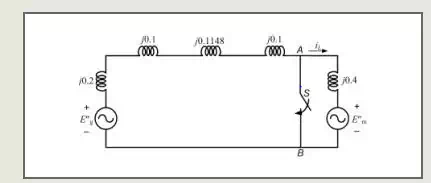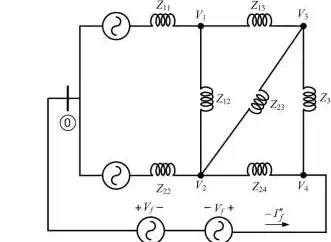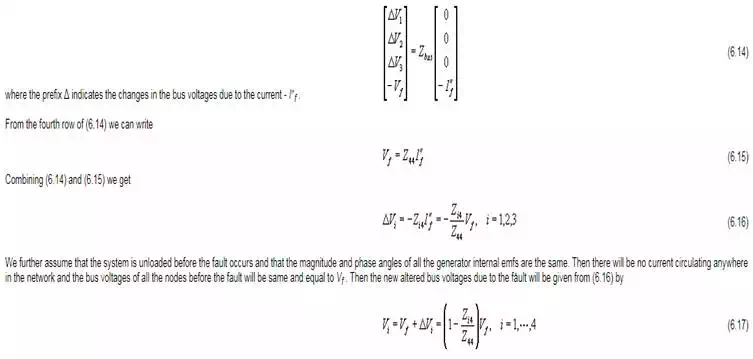Fault in a Power System
· Calculation of Fault Current Using Impedance Diagram
· Calculation of Fault Current Using Zbus Matrix
Calculation of Fault Current Using Impedance Diagram
Let us first illustrate the calculation of the fault current using the impedance diagram with the help of the following examples.
Example 6.1
Consider the power system of Fig. 6.8 in which a synchronous generator supplies a synchronous motor. The motor is operating at rated voltage and rated MVA while drawing a load current at a power factor of 0.9 (lagging) when a three phase symmetrical short circuit occurs at its terminals. We shall calculate the fault current that flow from both the generator and the motor.
We shall choose a base of 50 MVA, 20 kV in the circuit of the generator. Then the motor synchronous reactance is given by
|
|
|
Also the base impedance in the circuit of the transmission line is
|
|
|

A generator supplying a motor load though a transmission line.
Therefore the impedance of the transmission line is
|
|
|
|
|
|
The impedance diagram for the circuit is shown in Fig. 6.9 in which the switch S indicates the fault.

Impedance diagram of the circuit of Fig. 6.8.
The motor draws a load current at rated voltage and rated MVA with 0.9 lagging power factor. Therefore
|
|
|
Then the subtransient voltages of the motor and the generator are
|
|
|
Hence the subtransient fault currents fed by the motor and the generator are
|
|
|
and the total current flowing to the fault is
|
|
|
Note that the base current in the circuit of the motor is
|
|
|
Therefore while the load current was 1603.8 A, the fault current is 7124.7 A.
Calculation of Fault Current Using Zbus Matrix
Consider the circuit of Fig. 3.3 which is redrawn as shown in Fig. 6.10.

Fig. 6.10 Network depicting a symmetrical fault at bus-4.
We assume that a symmetrical fault has occurred in bus-4 such that it is now connected to the reference bus. Let us assume that the pre-fault voltage at this bus is Vf . To denote that bus-4 is short circuit, we add two voltage sources Vf and - Vf together in series between bus-4 and the reference bus. Also note that the subtransient fault current I²f flows from bus-4 to the reference bus. This implies that a current that is equal to - I²f is injected into bus-4. This current, which is due to the source - Vf will flow through the various branches of the network and will cause a change in the bus voltages. Assuming that the two sources and Vf are short circuited. Then - Vf is the only source left in the network that injects a current - I²f into bus-4. The voltages of the different nodes that are caused by the voltage - Vf and the current - I²f are then given by
